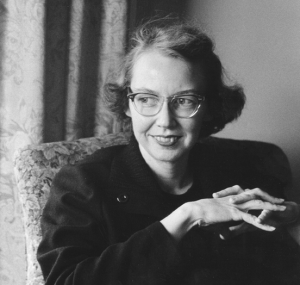Flannery O’Connor is a master of the American short story, joining since her untimely death in 1964, Hawthorne, Poe, Hemingway, and Faulkner in the literary canon. Benjamin B. Alexander from Publishers Weekly shares some little-known facts about O’Connor… Support our news coverage by subscribing to our Kindle Nation Daily Digest. Joining is free right now!
Here are some interesting observations about Flannery O’Connor:
1. O’Connor was amused about Ronald Reagan possibly acting in one of her stories. The prospect was long before Reagan took office and years before he was a “B” actor in Hollywood. O’Connor received word that “The Life You Save May Be Your Own” was being shopped around for an actor to play the part of the notorious, one-armed vagrant, Mr. Shiftlet. The notion of Reagan playing the part of a memorable villain was hilarious to O’Connor. Reagan playing the part did not come to fruition. O’Connor would have been been amazed that the Ronald Reagan she saw on television in the 1950s went on to become the celebrity President.
2. O’Connor actually witnessed Soviet “collusion” in the late 1940s. She was an ardent theological anti-communist and believed Marxism to be a theological heresy. While O’Connor was in residence at the Yaddo Artists’ Colony in New York, she had become friends with another writer in the community, the poet Robert Lowell. Lowell exposed infiltration of Yaddo by a communist spy while O’Connor was there. The FBI actually had been surveilling the community when Lowell went public with his anti-communism. O’Connor was steadfast in her support of Lowell. He and O’Connor would leave Yaddo but remained friends. O’Connor provided stability to Lowell’s sometimes erratic personality.
3. A Georgian, O’Connor resisted being labeled a Southern writer. In a letter, O’Connor asks a professor friend who had been lecturing on Southern literature, “What is that?” In 1956, O’Connor wrote another friend about her teachers, “They were agrarians—such people as John Crowe Ransom and Robert Penn Warren.… That was all part of what is now pompously called the Southern literary renascence.” Walker Percy, from Louisiana, shared her aversion to literary categorization. Upon publication of his existential novel The Moviegoer, Percy wrote his editor in April 1962, “And Knopf was such a grand old house before you had truck with dirty writers. Can’t speak for Updike or Mailer but mine is the worst of all because it pleases no one. It’s too Yankee to suit Southerners, too vulgar to suit Catholics, too Catholic to suit humanists, out but not way out.”
Read full post on Publishers Weekly

